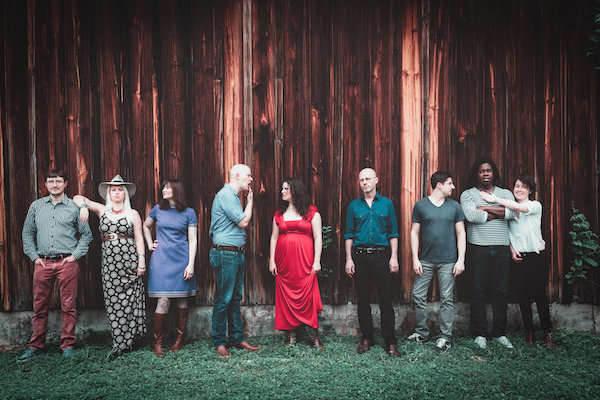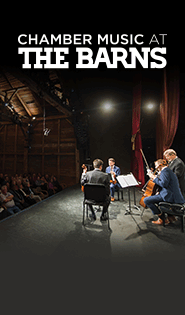Roomful of Teeth serves up a rewarding sampler of contemporary vocal music

Roomful of Teeth performed Saturday night in the Candlelight Concert Society series. Photo: Bonica Ayala
Candlelight Concert Society has finally returned to its main venue at Howard Community College in Columbia. On Saturday night, after being absent for over two years, Candelight’s music rang out again in the Horowitz Center’s Smith Theatre. Strange and wonderful music, courtesy of the pioneering vocal octet Roomful of Teeth, which concluded its latest American tour with a sort of Greatest Hits program.
Any survey of the contemporary repertoire for which this amplified chamber choir is known must include Caroline Shaw’s Partita for 8 Voices. The piece won Shaw the Pulitzer Prize for Music in 2013, when she was the youngest composer ever to win the award. The group has sung this unusual piece all over the world, including on their last visit to the area in 2016.
Saturday’s performance had a somewhat different sound. The only singers from the group’s recording on this tour were Virginia Kelsey (then Virginia Warnken) and the deep bass Cameron Beauchamp, who also serves as co-artistic director with its founder, Brad Wells. (Two of the singers on the tour are listed as members of the “extended company.”) The group performed without Wells conducting and without Shaw herself, who often sings at the third microphone.
Baroque forms nominally inspired each movement of Partita, but Shaw drew upon many vocal techniques including folk music. The first movement, “Allemande,” takes its fast pace from the dance form, and the group coordinated the tumult of spoken words and music with sparkling rhythmic unity.
The gentler second movement, “Sarabande,” was wordless, with the four women’s voices in almost imperceptible hummed glissandi that coalesced into perfectly tuned triads. The four men joined them, memorably creating buzzing overtones with throat singing techniques, an effect that is even more striking live than on the recording. The rapidly paced third movement, “Courante,” employs hocketed breath sounds, a technique the group learned from Inuit singers. (In an example of how political piety has gotten out of hand, some Inuit singers accused Shaw and Roomful of Teeth of “cultural appropriation” for using this music without attribution. In the wake of an Internet furore, the group has issued an apology but continues to perform the work.)
Shaw, a North Carolina native, amalgamated this pattern of rhythmic exhalations with a wordless quotation of the southern American folk hymn “Shining Shore.” The tune, composed by George F. Root, went with a text by David Nelson, a slave holder in Tennessee who fled to Illinois and became an abolitionist. The singers brought it out with great subtlety, a serene moment topped by high, glass-smooth soprano notes that led to a big finish.
The finale, “Passacaglia,” is based on a repeating chord progression like its namesake form. It grew steadily from its soft opening passages, moving into loud, nasal sound production and a jumble of chaotic spoken lines. Partita remains quite fascinating, even after multiple hearings.
The second half consisted of music written for the group by other favored composers. Missy Mazzoli’s Vesper Sparrow, from 2012, featured yodel-like shifts of vocal register in many voices, based on the composer’s study of Sardinian overtone singing. Virginia Kelsey took the solo line, as the brief text rose out of its wordless context.
Render, by Brad Wells, received a placid interpretation, with the ostinato voices a little too present on their pulsating motif. Sound engineer Randall Squires otherwise managed the balance of the eight amplified voices skillfully, sometimes adding electronic resonance or echo effects in other works.
The group offered the fourth movement, “I’m happy (reprise),” from Peter Shin’s bits torn from words as a preview of the work, which they have recorded for their upcoming new release this fall. The excerpt was promising, combining cantillation effects and some sections in chained suspensions, recalling the rhythmic tension and resolution of dissonance in baroque music.
Two pieces by Judd Greenstein rounded out the program, beginning with Run Away, composed specifically for Virginia Kelsey, who took the plangent solo part again here. The male voices accompanied with throat-singing techniques, and the other women provided Kelsey with some melodic echoes. Greenstein’s Montmartre added a final virtuosic blast to conclude this bracing concert, with remarkable rhythmic interplay from all voices, somehow navigating the dizzying metric shifts without losing any of the dance-like fervor.
The highlight of the evening, however, came with the hypnotic encore, a spare arrangement of Alev Lenz’s Fall Into Me, a song used in an episode of the television series Black Mirror. The remarkable tenor Jodie Landau took the solo part, sung by Martha Cluver when the group recorded the piece in The Tank, a seven-story steel water tank in Rangely, Colorado. The new version, with its mysterious electronically enhanced drone, proved an otherworldly soundscape.
Candlelight Concert Society presents Cuarteto Latinoamericano 7:30 p.m. April 23, in music by Campa, Ponce, Revueltas, and Ortiz. candlelightconcerts.org


